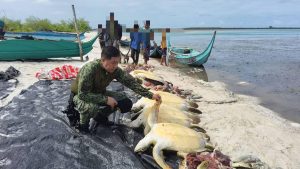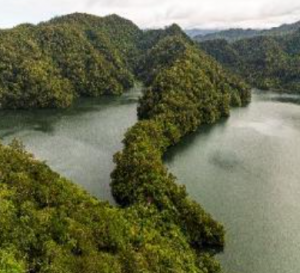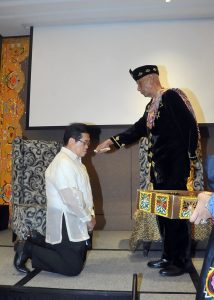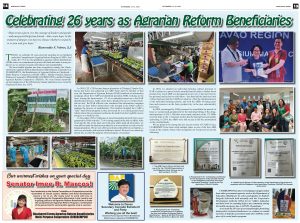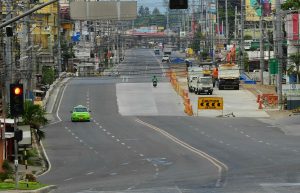

ON MARCH 8, President Rodrigo Duterte signed Proclamation No. 922 declaring the country under a state of public health emergency due to the COVID-19 pandemic and ordering all government agencies and local government units to cooperate and mobilize necessary resources to combat the novel coronavirus.
Davao City immediately responded by providing the legal framework to put systems in place. Mayor Sara Duterte, in one of her early interviews, said that the objective is to prevent a single case from reaching the city as this would spread in no time.
Ten months later, we continue to grapple with keeping the virus at bay even as we expect cases to increase with the inevitable gatherings during the holiday season.
Mindanao Times compiled the executive orders issued from March up to December 2020.
March 13
Mayor Sara Z. Duterte issued Executive Order No. 8, creating a Task Force on Covid-19 and other public health emergencies in the city.
The Task Force was ordered to:
a. Formulate, recommend, initiate and implement actions that shall address all concerns relating to necessary preparations and response to a public health emergency, such as the COVID-19, as may be defined by competent
authority;
b. Monitor and ensure the proper implementation of all government issuances and actions related to a public health emergency;
c. Ensure the integration and proper coordination of all government actions to efficiently address the public health emergency, and;
d. Do and perform all that is necessary to maintain peace and order, ensure and promote the health and safety, and preserve the comfort and convenience of the people in Davao City.
March 15
Executive Order No. 9, was issued banning all flights from Clark Airport to the Francisco Bangoy Airport. This came after the COVID-19 Inter-agency Task Force for Emerging Infectious Disease banned all flights coming in and out Manila.
March 18
EO10 was released, declaring the entire Davao City under Community Quarantine.
Under community quarantine rules, people are ordered to stay in their homes and may only come out to work, buy food or medicines, go to the hospital or to take out garbage, Mass gatherings and classes from kindergarten to post graduate studies are suspended until after the state of public emergency has been lifted.
Also, all religious activities are suspended, employees from other provinces may enter Davao City but necessary screening procedures must be followed, private companies must prepare and implement flexible work plan for their employees, require people to procure services and buy goods online from local suppliers, require online meetings and bank transactions and public transportation and cargo deliveries will be allowed.
On the same day, EO 11 series was released declaring a partial lockdown in Lasang checkpoint of Davao City.
Lasang checkpoint is one of the three entry points in the city in tne northern part.
March 17
EO 12 was issued on March 17, suspending all international air travel to and from Davao City.
EO13 was also released, declaring the suspension of all domestic travel to and from Davao City.
March 18
EO No. 14 was issued by the city government, an order temporarily prohibiting the selling or serving of liquors, alcoholic beverages, coconut wine, and other wines, and the like that cause intoxication from 5 pm to 8 am.
March 19
The city government issued orders closing all recreation and gaming establishments.
EO 15, ordered the closing of all internet shops, gaming stations, billiard halls, videoke bars, basketball courts, badminton courts, bowing alleys, movie houses, bingo outlets, E-gaming establishments, lotto outlets, kid’s playrooms, video arcades, spas, massage parlors, beauty salons/parlors, and carnivals or peryahan beginning 5pm of March 19 until after the State of Public Health emergency is lifted.
EO 16, an order requiring all malls and commercial complex buildings to close all shopping stores beginning 11:59pm of March 19 until after the State of Public Health emergency is lifted.
EO 17 was also released, an order adding members to the Davao City Task Force on Covid-19 and other Public health emergencies.
EO 18, an order granting exemption of certain International and Domestic air travel to and from Davao City in the implementation of Executive order no. 12 and 13.
EO 20, an order providing for additional guidelines in the implementation of Community Quarantine beginning 5am of March 26 until 11:59 of April 19 until unless further extended, modified or withdrawn.
EO 22, suspending all domestic air travel to and from Davao City.
Under Enhanced Community Quarantine (ECQ)
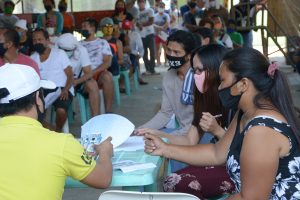
On April 2, EO 23, 23-A and 23-B were issued which provided guidelines of the city’s Enhanced Community Quarantine (ECQ). This came after the epidemiologist and infectious disease specialists demanded that people stay in their houses to arrest the spread of infection.
Under ECQ which is effectively a total lockdown, movement of the people is restricted except for necessity, work, and health circumstances, in response to the COVID-19 pandemic. Additional restrictions mandated the temporary closure of non-essential shops and businesses.
EO 24 provided for the extension of the Enhanced Community Quarantine and other activities.
EO 25 ordered a period of mourning and vigilance in Davao City from April 17 until December 31, 2020. During this period all the city and national government celebrations, parties, anniversaries, and festivities are cancelled.
April 20
EO NO. 26 was issued creating and constituting a Task Force and Executive Committee to effectively respond to emerging and re-emerging Infectious Disease in Davao City, and defining the respective powers, task and functions.
April 27
EO 28 was issued providing for the extension of the Enhanced Community Quarantine and other activities.
EO 29, was also issued, an order creating a Davao City Inter-agency Task Force against Child Labor in line with EO No. 92, “Institutionalizing the National Council Against Child Labor to upscale the implementation of the Philippine program against child labor.
EO 30 was released, an order for reorganizing the local council for the protection of Children and Inter-agency Monitoring Task Force of the city.
EO 31, an order reconstituting the Davao City price coordinating council, defining its functions, powers, and for other purposes. This was issued to ensure that the availability of basic necessities and prime commodities are sold at reasonable prices, and to increase visibility and intensify monitoring of prices to protect consumers from unscrupulous traders and retailers against undue price increases during emergency situations.
EO 32 was issued, an order adopting the IATF amendments to the Omnibus guidelines for the implementation of the Enhanced Community Quarantine.
Davao City under GCQ
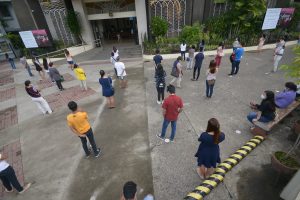
The IATF-EID placed Davao City under General Community Quarantine (GCQ) from Enhanced Community quarantine (ECQ) on May 15, 2020.
GCQ is a form of quarantine with more relaxed measures compared to Enhanced Community quarantine. It is enforced in the cities and municipalities considered to have low or moderate risk of COVID-19 cases.
EO 33 and 33-A was issued by the city government, an order providing for a General Community Quarantine to be implemented on 12:01 May 16 until 11:59 pm of May 31 unless further extended, modified or withdrawn.
June 10
EO 37 was issued by the city government, an order requiring mandatory COVID-19 testing before admission into or release from government rehabilitation centers and jails.
EO 38 was also issued creating a one stop shop team for the management of Locally Stranded Individuals in Davao City.
Some of the essential workers and individuals used bicycles as means of transportation so in response, EO 40 was issued, an order providing for the suspension of bicycle registration, bicycle registration fees, and allowing the use of bicycle lanes in the city.
June 24
Amid the pandemic, the Task Force Davao pushed for vigilance in implemng anti-terrorism efforts in the city.
EO 41 was issued, an order encouraging Dabawenyos to adopt the Culture of Security as part of their way of life.
EO 45 was issued reconstituting the composition of Davao City Local Health Board.
Under Modified General Community Quarantine (MGCQ)
The city has been under MGCQ since July 1 but with strict enforcement on localized Community Quarantine zoning, minimum heath standards and health capacity systems.
MGCQ, is the lowest form of community quarantine. Under MGCQ, more establishments are now allowed to operate.
EO 50 was issued to provide for the lifting of the 24-hour liquor ban in the city effective September 21.
EO 52 was issued by the city government, an order regulating the operation of funeral parlors, cemeteries, memorial parks, and Columbariums effective September 23 until after the State of Calamity (Proclamation 1021) is lifted.
Sept 25
EO 53 was released, an order requiring mandatory COVID-19 RT -PCR testing for patients referred to hospitals in Davao City and other purposes.
During the month of October, the city experienced a surge of infections because of the activities during the Modified General Community Quarantine.
EO 55 and 55-A, 55-B, was issued enforcing curfew and regulating other activities until December 31, 2020.
EO 56 was released, an order for the adoption of other alternative work arrangements in public and private offices until December 31, 2020.
EO 57, an order regulating mass gatherings and prohibiting non-essential travel within Davao City and for other purposes until December 31, 2020.
EO 58 was released by the city government, an order defining vulnerable age and vulnerable sector following the provisions of IATF Resolution no. 79.
EO 59 was also issued by the city government, an order reimposing a 24-hour liquor ban in the city effective November 2 until December 31, 2020.
With the increase in COVID-19 cases, the Southern Philippines Medical Center and Temporary Treatment and Monitoring Facilities (TTMF) reported the lack of beds and requested to impose stricter protocols.
Thus, the city government issued EO 60, an order providing for the guidelines of the Safe Davao Quick Response (DQR).
The DQRs was implemented to boost the contact tracing in the city and maintain a contactless data gathering and electronic storage of data.
The DQR is also intended to implement the prohibition of non -essential movement within the city.
Currently, the three checkpoints (Barangay Lasangin Bunawan , Lacson in Calinan and Sirawan in Toril) in the city manned by the Task Force Davao with local police implemented a No QR code. No travel and No entry in the city.
Reverting to GCQ
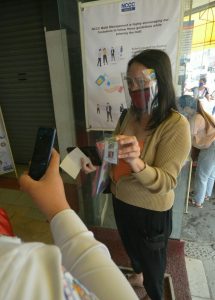
On November 20, President Rodrigo Duterte reverted the city to the General Community Quarantine status until November 20, following a spike in the COVID-19 cases.
However, Davao City remains among the top of the list with new cases daily based on the data of the Department of Health, thus the General Community Quarantine status in the city was extended to December 31, 2020.
EO 62, was issued, providing for the guidelines of enforcement of the prohibition of the non-essential travel in Davao City. This means that movement for amusement, entertainment, leisure and gaming are prohibited.
EO 63, 63-A and 63-B was released, an order providing for the guidelines of Davao City as a restricted local government unit. This means that there is a need to seek the assistance of Joint Task Force (JTF) COVID Shield for enforcement of Authorized Persons Outside Residence (APOR) and NON-APOR travel into Davao City to insulate other Local Government Units (LGUs) from the effect of the surging cases in the city as well as to further protect the residents of the city.
EO 65 and 65-A was issued by the city government, an order consolidating all the issuances on the use of face shields. The order stated the mandatory use of face shields in areas such as malls, banks and other places where people gather.
As the Covid-19 pandemic continues, tDavaoenoes will expect more executive orders to be released by the government to strengthen the fight against the Covid-19.
(About the author: Rhoda Grace Saron is a reporter of Mindanao Times covering the general beat.) The production of this special report was made possible with support from the Information Saves Lives project of Internews.


